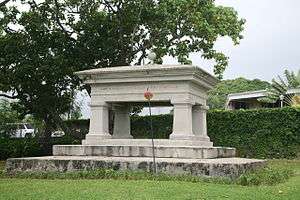List of burials in the Royal Mausoleum of Hawaii
The following is a list of burials in the Royal Mausoleum of Hawaii, in Nuʻuanu Valley (within Honolulu, Hawaii). Many took royal titles after their predecessors; the list below gives birth name as well if different.
Kamehameha Tomb
The Kamehameha Dynasty Tomb

Monument to Charles Reed Bishop, husband of Princess Bernice Pauai Bishop. Although Bishop is actually buried in the Kamehameha Tomb.
- Queen Kaʻahumanu (c. 1768–1832)[1][2]
- King Kamehameha II, Liholiho (1797–1824)[1][2]
- Queen Kamāmalu, Victoria Kamāmalu (1802–1824)[1][2]
- King Kamehameha III, Kauikeaouli (1813–1854)[1][2]
- Queen Kalama (1817–1870)[1][2]
- High Chiefess Kamānele (1814–1834)[1][2]
- Prince Keaweaweʻulaokalani I (January 1832–February 1832)[1][2]
- Prince Keaweaweʻulaokalani II (1839?)[1][2]
- Queen Kīnaʻu Kaʻahumanu II, Elizabeth Kīnaʻu (1805–1839)[1][2]
- King Kamehameha IV, Alexander Liholiho (1834–1886)[2]
- Queen Emma, Emma Kaleleonālani Rooke (1836–1885)
- Prince Albert Kamehameha, Albert Edward Kauikeaouli (1858–1862)
- King Kamehameha V, Lot Kapuāiwa (1830–1872)
- Princess Victoria Kamāmalu Kaʻahumanu IV (1838–1866)
- Prince Moses Kekūāiwa (1829–1848)[1][2]
- Prince David Kamehameha (1828–1835)[1][2]
- High Chief William Pitt Leleiohoku I (1821–1848)[1][2]
- Princess Ruth Keʻelikōlani (1826–1883)
- Prince John William Pitt Kīnaʻu (1842–1859)[1][2]
- Prince Keolaokalani Davis Bishop (1862–1863)[1][2]
- High Chief Pākī, Abner Kuhoʻoheiheipahu Pākī (1808–1855)[1][2]
- High Chiefess Kōnia, Laura Kōnia (1808–1857)[1][2]
- High Chiefess Bernice Pauahi Bishop (1831–1884)
- Charles Reed Bishop (1822–1915)
- A caskets containing the ʻiwi (bones) of Līloa and Lonoikamakahiki the only discernible remains rescued from Hale O Keawe and Hale O Līloa by Queen Kaahumanu and later transported to Oahu by King Kamehameha IV[2]
- The other remains of 23 kings of chiefs were placed in two caskets containing the ʻiwi (bones) of Keohokuma, Okua, Umioopa, Keaweluaole, Keaweakapeleaumoku, Kuaialii, Kaaloa, Lonoakolii, Kaleioku, Kalaimamahu, and Kaoleioku, and in other coffin, Keawe, Kumukoa, Lonoikahaupu, Huikihe, Kekoamano, Keaweakanuha, Niula, Kowaiululani, Lonoamoana, Lonohonuakini, Ahaula, Okanaloaikaiwilewa. These names are undiscernible in their original forms and historians speculate they may be Keaweʻīkekahialiʻiokamoku, his father and sons, Lonoikahaupu, Kalaniʻōpuʻu, Kaʻōleiokū, and Kalaʻimamahu.[3][4]
Kalākaua Crypt

Entrance to the Kalākaua Crypt.
- King Kalākaua (1836–1891)[5]
- Queen Kapiʻolani (1834–1899)[5]
- Queen Liliʻuokalani (1838–1917)[6]:30–39
- Prince Consort John Owen Dominis (1832–1891)[5]
- High Chief Caesar Kaluaiku Kapaʻakea (1815–1866)[5]
- High Chiefess Analea Keohokālole (1816–1869)[5]
- Princess Miriam Likelike (1851–1887)[5]
- Archibald Scott Cleghorn (1835–1910)[6]:30–39
- Princess Victoria Kaiʻulani (1875–1899)[5]
- Prince William Pitt Leleiohoku II (1854–1877)[5]
- Kaiminaʻauao (1844–1848)[5]
- Princess Virginia Poʻomaikelani (1839–1895)[5]
- Princess Victoria Kūhiō Kekaulike (1843–1884)[5]
- Prince David Kawānanakoa (1868–1908)[5]
- Prince Jonah Kūhiō Kalanianaʻole (1871–1922)[6]:30–39
- Prince Edward Abnel Keliʻiahonui (1869–1887)[5]
- Princess Abigail Campbell Kawānanakoa (1882–1945)[6]:30–39
- Prince David Kalākaua Kawānanakoa (1904–1953), last to be buried.[6]:30–39
- A casket with remains of ancient chiefs, perhaps those of Naihe or Keawe-a-Heulu and Keliʻimaikaʻi[5]
Wyllie Tomb

Wyllie Tomb.
- Robert Crichton Wyllie (1798–1865)[2][6]:40–46[7]
- Bennett Nāmākēhā (c. 1799–1860)[1][2][6]:40–46[7]
- Grace Kamaʻikuʻi (1808–1866)[6]:40–46[7]
- Thomas Charles Byde Rooke (1806–1858)[1][2][6]:40–46[7]
- Jane Lahilahi (1813–1862)[1][2][6]:40–46
- Peter Kaʻeo (1836–1880)[6]:40–46[7]
- Albert Kūkaʻilimoku Kūnuiākea (1853–1903)[6]:40–46[7]
- Fanny Kekelaokalani (1806–1880)[6]:40–46[7]
- Keoni Ana (1810–1857)[1][2][6]:40–46
John Young Tomb
John Young's gravesite
- John Young (c. 1742–1835)[6]:45
- High Chiefess Kaʻōanaʻeha (c.1780–1850)[6]:45
Unsure
The following are some names whose identities or which tombs they are interred in are not known for sure. The men are identified by a (k) for kāne (Hawaiian for "male" or "man"), and the women by a (w) for wahine (H: female or woman).
- Alapaʻi (w),[2][8] either Alapaiwahine, Kalākaua's great-grandmother, or Julia Alapaʻi, the wife of Keoni Ana
- Naʻea (k),[2][8] probably George Naʻea, the biological father of Queen Emma.
- Kaʻeo (k),[2][8] probably Joshua Kaʻeo, uncle of Queen Emma.
- Maikui (w),[2][8] unknown
- Kepoʻokawelo (n),[2] unknown
- Nueu (k),[2][8] unknown
- Kakohe (k),[2][8] advisor of ʻUmi-a-Līloa
- Kapiʻolani I,[8] but other sources says she is still buried in the plot at Pohukaina
- Timothy Haʻalilio, but other sources says he is still at Pohukaina or buried in a neglected grave in the Kawaiahaʻo Cemetery[9][1]
References
- 1 2 3 4 5 6 7 8 9 10 11 12 13 14 15 16 17 18 19 20 21 "Ka Hoihoi Ia Ana O Na Kino Kupapau O Na Alii I Make Mua Ma Ka Ilina Hou O Na Alii". Ka Nupepa Kuokoa. IV (44). November 4, 1865. p. 2. Retrieved October 7, 2016.
- 1 2 3 4 5 6 7 8 9 10 11 12 13 14 15 16 17 18 19 20 21 22 23 24 25 26 27 28 29 30 "Royal Mausoleum". The Hawaiian Gazette. March 10, 1899. Retrieved June 28, 2010.
- ↑ Alexander, William DeWitt (1894). "The "Hale o Keawe" at Honaunau, Hawaii". Journal of the Polynesian Society. London: E. A. Petherick. 3: 159–161.
- ↑ John F. G. Stokes (1930). "Burial of King Keawe". Hawaiian Journal of History. Hawaiian Historical Society: 63–72.
- 1 2 3 4 5 6 7 8 9 10 11 12 13 14 Thrum, Thomas G., ed. (1909). "New Kalakaua Dynasty Tomb". All About Hawaii: The Recognized Book of Authentic Information on Hawaii. Honolulu: Honolulu Star-Bulletin. pp. 105–110.
- 1 2 3 4 5 6 7 8 9 10 11 12 13 14 15 16 Parker, David Paul (2008). Tales of Our Hawaiʻi (PDF). Honolulu: Alu Like, Inc.
- 1 2 3 4 5 6 7 Thrum, Thomas G., ed. (1904). "Kamehameha Tomb". All About Hawaii: The Recognized Book of Authentic Information on Hawaii. Honolulu: Honolulu Star-Bulletin. p. 180.
- 1 2 3 4 5 6 7 "Na Alii Hawaii i Mauna Ala". Ko Hawaii Pae Aina. February 14, 1891. Retrieved June 28, 2010.
- ↑ Douglas, Laurel (November 2000). "In Honor of the Memory of Timoteo Kamalehua Ha'alilio". The Polynesian. Retrieved 2010-02-25.
This article is issued from Wikipedia - version of the 10/25/2016. The text is available under the Creative Commons Attribution/Share Alike but additional terms may apply for the media files.